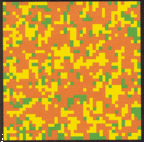Ethics Decision Theory Simulations
by Joseph Schreiner
Scenario 5 (Challenging) Payoff Correlation = -0.50
This scenario is the most interesting of the five, halfway between Neutral and Zero-Sum, with a Payoff Correlation of -0.50. It is in this environment that the most difficult and revealing ethical decisions are made. Any gain made by Self-Agent is likely, but not necessarily, to result in Other-Loss. This scenario requires the most subtle judgement to increase Self-Gain, avoid decreasing Other-Gain, and approach Equality.

Even though there was a substantial negative correlation between Agent payoffs, the Agents were still able to eke out a positive average Self-Gain. So despite discordant encounter payoffs, Agents were still able to make and give gain. This is even more significant than when the Payoff Correlation was 0.00. In an environment where their interests were in conflict, rational Agents could still achieve positive gain.
Again, Basic Strategy dominated the results for Self-Gain:
- Best Row showed the most Self-Gain.
- Minimize Loss
- Best Cell
- Assume Selfish
- Assume Persecution
- Assume Benevolence
- Assume Death-Wish
- Least Surprise
- Most Surprise showed least Self-Gain.
Like the Zero-Sum scenario, only the first five Basic Strategies had an average positive Self-Gain. The latter four Basic Strategies showed Self-Loss.

Basic Strategy and Altruism contributed equally to Other-Gain. As would be expected, the rank order of Basic Strategies for Other-Gain is nearly (but not exactly) the reverse of Self-Gain:
- Most Surprise yielded most Other-Gain.
- Least Surprise
- Assume Death-Wish
- Assume Benevolence
- Assume Persecution
- Assume Selfish
- Best Cell
- Best Row
- Minimize Loss yielded the least Other-Gain.
Best Row and Minimize Loss actually generated negative average Other-Gain. It should be remembered that Altruism made an important contribution to Other-Gain, so this ranking is not as definitive as Self-Gain's ranking.
This scenario also showed a shift in the source of Altruism. In the more concordant scenarios, Reciprocity was the larger factor in Altruism (Agent responds with Altruism to previous encounter gains). But in the Challenging scenario, Good/Bad Will became the more important source of Altruism (or Antagonism). Both Good/Bad Will and Reciprocity made substantial contributions, but the former was the more important. As the average encounter payoff tends toward zero, Reciprocity is less likely to occur. In the Challenging scenario, it was unvarying Good/Bad Will that contributed most to Altruism, and consequently, to Other-Gain.

Disregarding Altruism, which made an important contribution to Other-Gain, we can still rank Basic Strategies according to Commonwealth, the sum of Self-Gain and Other-Gain. But in the Challenging scenario, Commonwealth begins to approach zero. Any Self-Gain is likely to be cancelled by Other-Loss. The relationship between the two is still not absolute, so we still have a valid Commonwealth ranking:
- Best Row showed the most Commonwealth.
- Minimize Loss
- Best Cell
- Assume Selfish
- Assume Persecution
- Assume Benevolence
- Assume Death-Wish
- Least Surprise
- Most Surprise showed the least Commonwealth.
This ranking happens to be the same as that for Self-Gain. An important observation here is that the average Basic Strategies showed positive Commonwealth. So even in this Challenging scenario, the overall population was able to increase its Commonwealth above zero. Commonwealth, through Other-Gain, was also significantly affected by Altruism.

Altruism (either component) made no contribution to Equality. Equality was almost entirely determined by Basic Strategy. The Challenging ranking on Equality was the same as the Zero-Sum scenario:
- Least Surprise showed the most Equality.
- Minimize Loss
- Assume Selfish
- Assume Persecution
- Best Row
- Assume Death-Wish
- Assume Benevolence
- Best Cell
- Most Surprise showed the least Equality.
In the Challenging scenario, Commonwealth tended toward zero for all strategies, making it less important in computing Total Ethics. In contrast, Equality (or actually its inverse, Inequality) contributed more to the spread in payoffs, becoming more important in computing Total Ethics. Total Ethics, computed from these weighted contributions, ranked Basic Strategies as:
- Minimize Loss was the most ethical.
- Assume Selfish & Least Surprise were tied for 2nd & 3rd place.
- Best Row
- Assume Persecution
- Best Cell and Assume Death-Wish were tied.
- Assume Benevolence
- Most Surprise was the least ethical.
Altruism, through Commonwealth and Other-Gain, made a positive contribution to Total Ethics.